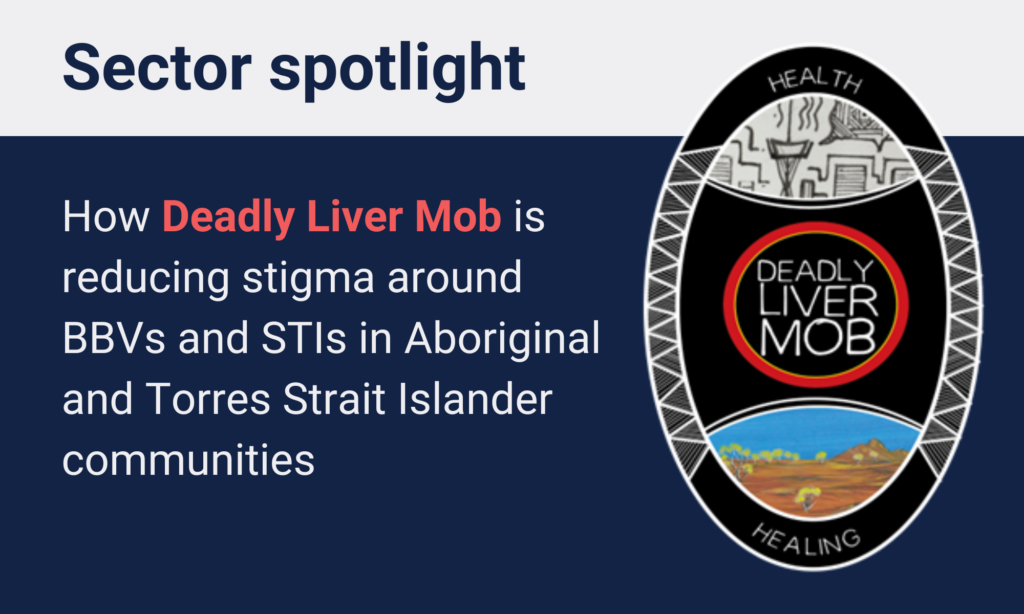
How Aboriginal and Torres Strait Islander-led program Deadly Liver Mob is fighting stigma and improving health outcomes around viral hepatitis and sexually transmitted infections.
With education and awareness can come better health outcomes and less fear, particularly when it comes to the prevention of blood borne viruses (BBVs) and sexually transmitted infections (STIs) among Aboriginal and Torres Strait Islander peoples.
Dr Elena Cama, Research Associate at the Centre for Social Research in Health at UNSW Sydney, says a lack of knowledge around transmission can in turn fuel stigma around BBVs and STIs.
“If people aren’t aware of how [BBVs and STIs] are transmitted, they can have a lot of fears and misconceptions, and also because of the negative attitudes towards behaviors associated with transmission,” says Dr Cama.
For education to be effective in driving better health outcomes among Aboriginal and Torres Strait Islander communities, the communication of health messaging needs to be community-led and tailored.
The need to increase education and reduce stigma around BBVs and STIs in Aboriginal and Torres Strait Islander communities has been recognised by the Australian Government as requiring urgent action. The Fifth National Aboriginal and Torres Strait Islander Blood Borne Viruses and Sexually Transmissible Infections Strategy 2018–2022 recommends the implementation of “community-led, peer-based approaches” to improve knowledge and address stigma related to BBVs and STIs.
One program showing the power of Aboriginal and Torres Strait Islander-led intervention initiatives is Deadly Liver Mob.
Deadly Liver Mob offers hepatitis C and sexual health education and referral to testing and treatment for Aboriginal and Torres Strait Islander community members. Driven by Aboriginal and Torres Strait Islander workers, Deadly Liver Mob incentivises attendance through a voucher system and encourages the dissemination of health messages by asking attendees to share their new knowledge of hepatitis C with others. Currently, Deadly Liver Mob operates at nine sites across New South Wales.
During its first-year pilot at just one site, Deadly Liver Mob reached more than 400 Aboriginal or Torres Strait Islander community members, of which 300 were referred onto sexual health screenings – representing a 1,023 per cent increase in access to sexual health services. By 2020, Deadly Liver Mob had educated 1,787 Aboriginal or Torres Strait Islander peoples across all nine sites, with 74 per cent participating in screening.
Kerri-Anne Smith, an Aboriginal Hepatitis C Health Promotion Officer at Deadly Liver Mob at Mount Druitt, has been with the program since the beginning in 2013 and has seen the incredible progress of program participants.
“We were quite surprised at the very limited knowledge that people had when they first visited here,” says Kerri-Anne. “Most clients had never been to a sexual health clinic.”
Kerri-Anne says that Deadly Liver Mob participants are now more aware of STIs and BBVs, and proactively access health care as a result.
“A lot of the Deadly Liver Mob women have made connections with the sexual health clinic, and have come back for regular checkups,” says Kerri-Anne. “They come back outside of the project, not expecting a voucher, but for their own health needs.”
Aboriginal and Torres Strait Islander staff have been integral to the co-design, implementation, and success of Deadly Liver Mob, with culturally safe practices such as yarning integrated into program delivery.
“It’s Aboriginal run for Aboriginal peoples, so it breaks down the mistrust barrier a little bit,” explains Kerri-Anne, adding that being a peer worker with lived experience has helped to further build trust.
“I was very open in disclosure that I had had hepatitis C and I had been on treatment and that I understood. So, I believe it worked well that I wasn’t using a lecturing style — I was a living breathing example of ‘you can get through it, you can get through the treatment and it can be cured.’ I think that builds a lot of trust.”
Kerri-Anne says that Deadly Liver Mob participants have also become more trusting of the health system overall due to their positive experiences in the program.
“It has a ripple effect as well because [Deadly Liver Mob participants] knew they could trust this service and me and people I worked with. It became a real referral service, they trusted that if we referred them to somebody, and because we trusted them, they could trust the service.”
Deadly Liver Mob
The success of Deadly Liver Mob in supporting participants to check and manage their health without fear shows that Aboriginal and Torres Strait Islander workers are best placed to deliver health messages appropriately and effectively in their communities. Aligning with one of the considerations from the Cultural Respect Framework 2016-2026 for Aboriginal and Torres Strait Islander Health, Dr Cama says for change to occur on a larger scale, more investment is needed into Aboriginal and Torres Strait Islander healthcare workers.
“Making sure that we have a consistent, ongoing stable health workforce of Aboriginal and Torres Strait Islander peoples is really important in order to create that kind of culturally safe health spaces for people to engage in care,” says Dr Cama.
Investment needed in the Aboriginal and Torres Strait Islander health workforce is not just limited to employment, but also culturally safe training and professional development opportunities. A recent series of ‘Managing hepatitis B’ courses piloted in remote Northern Territory communities demonstrates a transferable framework of culturally safe education for Aboriginal and Torres Strait Islander health professionals.
Dr Cama agrees that effective, culturally appropriate communication and education is needed for health professionals to improve their health literacy and reduce stigma around BBVs and STIs, which would have flow on effects and improve the knowledge of people accessing health services.
“If the health system doesn’t have the means to provide effective communication, then how can we expect individuals to have good health literacy, right?” says Dr Cama.
“If health workers themselves don’t have that literacy around hepatitis, then they don’t have the knowledge to be able to provide health promotion to clients to give them education around hepatitis B and C. That’s a missed opportunity then both for providing education, but also encouraging people to go through to screening and then subsequently vaccination.”
"With education comes understanding"
– Kerri-Anne Smith, Aboriginal Hepatitis C Health Promotion Officer at Deadly Liver Mob
Deadly Liver Mob’s long-term success shows how investment into Aboriginal and Torres Strait Islander-led intervention and culturally safe education can make a real difference.
Government, communities, and the health workforce can work together to eliminate stigma around BBVs and STIs among Aboriginal and Torres Strait Islander peoples through further investment in peer and community-led programs. Alongside other much-needed measures at a structural level — including addressing institutional racism, embedding culturally-appropriate healthcare, and improving access — such further support will go a long way towards creating a healthcare system where everyone can feel safe, confident, and informed when accessing care.

